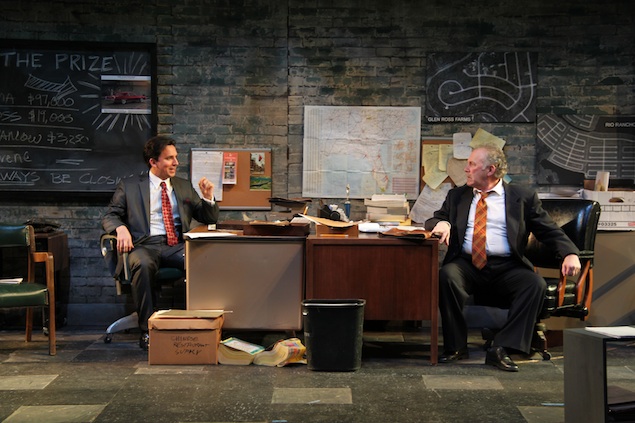
To see
Glengarry Glen Ross, currently playing in a strong production at Round House Theatre, is to see some
of Washington’s finest actors obviously relishing the chance to interact with one
another as soulless douchebags. Alternating among casual racism, sexism, and the kind
of language that you typically only hear at NASCAR events, the likes of
Rick Foucheux,
Alexander Strain,
Conrad Feininger, and
Jeff Allin embody their 1980s Chicago real estate agents with a sense of humor and joy that
takes the edge off of
David Mamet’s cynical and downright bleak look at humanity.
Given Mamet’s overt conservatism and fanaticism when it comes to free market principles,
it might seem odd that what’s possibly his most famous play involves the kind of trickery
and moral turpitude that would make a junk bonds broker blush. Directed by
Mitchell Hébert, another leading light in local theater, Round House’s
Glengarry follows a widely panned recent Broadway revival starring Al Pacino, Bobby Cannavale,
and Richard Schiff (currently starring in Shakespeare Theatre’s
Hughie). In the hands of Hébert, Mamet’s 1984 Pulitzer winner is a funny, darkly enjoyable
look at greed gone wild.
Happily unbefuddled by “a middle-class morality,” the four salesmen encountered in
act one are seen boozing it up over lunch in a Chinese restaurant. Shelly Levene (Foucheux)
is a past-his-prime shuckster alternately insulting implacable office manager Williamson
(Kenyatta Rogers) and begging him for help with leads on potential clients. At another table, Dave
Moss (Allin) cajoles George Aaronow (Feininger) into contriving with him to rob the
office, steal all the leads, and sell them to a rival agency. (“It’s a crime. It is
a crime. It’s also very safe,” says Moss, unironically.) The last salesman, Ricky
Roma (played brilliantly by Strain), impresses a mousy client (Jesse Terrill) with tales of fast living before roping him into making a purchase.
Despite the magnetism of the actors, the first act is slightly obfuscated by the heavy
use of corporate jargon that can feel alienating to the audience. It’s in act two,
when
James Kronzer’s set miraculously transforms into a brick-walled office (so unexpectedly that it
got a round of applause from the audience on opening night) that the action starts
to sing like Maria Callas at
La Scala. As power ebbs and flows among the characters, Levene and Roma chafe with palpable
desperation, while the presence of a cop (Stephen Patrick Martin) in Williamson’s office seems to drive the salesmen to even more dastardly behavior.
“You don’t have the balls,” shouts Levene at one point, making an obscene cupping
gesture with his hands. In
Glengarry, aggressive machismo is the second most important currency.
Ivania Stack’s costumes enhance the Oliver Stone ’80s-ness of it all, particularly
Williamson’s high-waisted pants and the universal sporting of geometric ties. Hanging
on the office wall is an ever-changing chalkboard ranking sales figures with a picture
of the ultimate prize for top dog: a Cadillac (judging from Levene’s naked fear, the
booby prize is getting canned). Mamet’s inelegant, uber-realistic language drives
home the familiarity of the four salesmen and their hungry approach to life—“always
be closing” is the firm’s motto, which isn’t a million miles away from, say, LivingSocial’s
“live hungry.”
Glengarry Glen Ross might hail from a bygone era (“We are members of a dying breed,” says Roma, mournfully),
but the standards it espouses have long since been absorbed into the mainstream.
Glengarry Glen Ross
is at Round House Theatre Bethesda through March 3. Running time is about 80 minutes,
with no intermission. Tickets ($26 to $63) are available via Round House’s website.
















